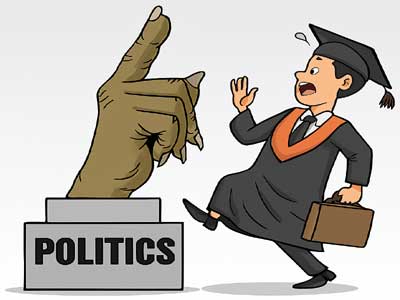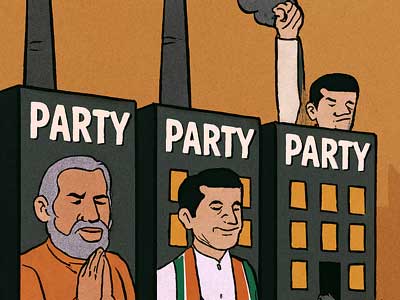The Election Commission of India has taken massive strides in ensuring inclusivity and accessibility in the General Elections 2024 to ensure that no eligible voter is deprived of their right to vote on account of physical or other barriers.
So far, after the conclusion of the six phases of elections, immense enthusiasm was seen amongst voters of various sections such as Persons with Disabilities, Senior Citizens, Transgenders, and PVTGs. Facility for voting from the comfort of home for senior citizens above 85 years of age and PwDs with 40 per cent benchmark disability was extended for the first time on pan India basis in General Elections 2024.
The preparations started two years back with concerted efforts of updation and registration of eligible citizens in the electoral rolls. This was achieved by conducting special registration drives, and camps, targeting these categories of voters. ECI has adopted a multipronged strategy to enhance participation amongst communities which are prone to be deprived of their right to vote.
The optional home voting facility marks a paradigm shift in the electoral process and has been made available for the first time in the history of India’s general elections. Any eligible citizen aged 85 and above or with a 40 per cent benchmarked disability, can avail the provision of a home voting facility through postal ballot in these elections. This facility has received an enthusiastic response from voters. Gratifying scenes of smiling voters and their testimonials voting from the comfort of their homes have flooded social media from all parts of the country. Voting from home takes place with the involvement of a full contingent of polling staff and security personnel with the secrecy of voting diligently maintained. Agents of candidates are also allowed to accompany polling teams to witness the process.
To bridge any infrastructural gaps, ECI ensured that every polling booth was on the ground floor, equipped with assured amenities including ramps, signages for voters, parking space, separate queues, and volunteers. Additionally, ECI’s SAKSHAM app has facilitated PwDs for availing various facilities at polling stations like wheelchairs, pick-and-drop and volunteer services. There have been over 1.78 lakh downloads of the Saksham App since the announcement of the elections.
The Commission has also made provisions for Braille on EVMs, Braille-enabled EPIC, and voter slips to assist visually impaired electors. Further, a Voter Guide for PwDs and Senior Citizens, in English and Hindi, with information on the process of registration to poll day facilitation was made available.
Apart from eradicating physical barriers to voting, ECI also made efforts to address social barriers and stigma surrounding certain vulnerable populations like Transgenders, Sex workers, and PVTGs to ensure their participation in the election process. Special camps were arranged to enrol the third-gender electors and other marginalized communities like sex workers and PVTGs Thane District in collaboration with civil society. Over 48,260 TGs are enrolled all over the county, out of which Tamil Nadu has the highest number of third-gender electors with 8467, followed by 6628 TGs in Uttar Pradesh and 5720 TGs in Maharashtra.
The homeless and other nomadic groups are another critical demographic in achieving high electoral participation. Due to their unique circumstances, these individuals can experience unintentional electoral exclusion because of a lack of proof of residency. However, special efforts were made in the last two years for their enrolment as voters and also participation in the voting process. The location of new polling booths in previously inaccessible areas has led to the large-scale inclusion of PVTGs. In many states, where PVTGs reside in large numbers, free transportation facilities have been provided to enable the PVTGs to reach polling stations from remote areas. In a historic move, the Shompen tribe of Great Nicobar voted in the Lok Sabha Election -2024 for the first time.
Further, in a major decision to facilitate voting by Kashmiri migrants in the ongoing General Elections 2024, ECI abolished the cumbersome procedure of filling Form-M for the displaced people from the valley who are residing in Jammu and Udhampur. Additionally, for the migrants residing outside Jammu and Udhampur, ECI has authorized the self-attestation of the certificate appended with Form-M, thus removing the hassle of getting this certificate attested by the Gazetted Officer. The Commission has enabled Kashmiri migrant voters residing at various relief camps in Delhi, Jammu, and Udhampur to also have the option of voting in person at designated special polling stations or using postal ballot. 21 Special Polling Stations were established at Jammu, one at Udhampur and four at Delhi.
Similarly, to ensure voting rights for Internally Displaced Persons in Manipur, 94 Special Polling Stations were set up in 10 districts. One SPS was set up in the Tengnoupal district for a single voter. Poll was conducted under webcasting and displaced persons staying outside relief camps could also opt to vote at SPS.


















Related Items
India stuck in traffic; Cities halt, Horns holler, and time takes a nap
India’s deep dark fraud economy unveiled…
Bangladesh’s Radicals vs India’s Liberals, A dangerous imbalance…